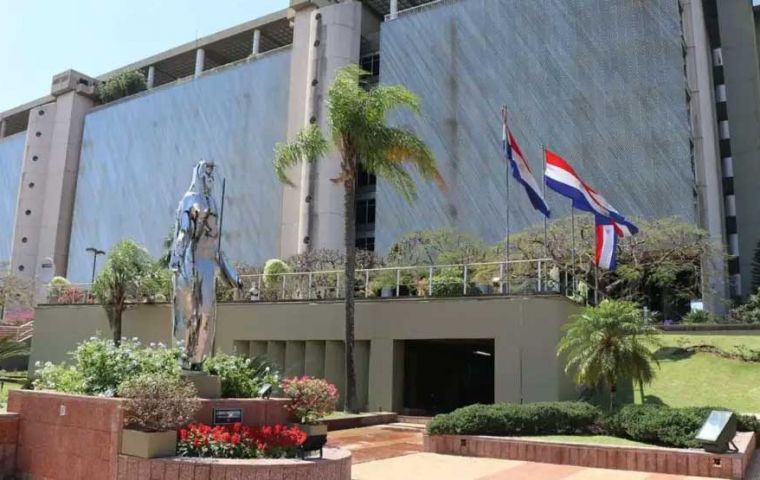MercoPress. South Atlantic News Agency
Paraguay's BCP outlines scenario under Trump's policies
 Trump's measures target “those countries with which the US maintains high trade deficits such as Mexico and China,” the BCP stressed
Trump's measures target “those countries with which the US maintains high trade deficits such as Mexico and China,” the BCP stressed Paraguay's Central Bank (BCP) has picked up the glove from US President Donald Trump's barrage of protectionist economic measures and spoke of higher financing costs among the possible consequences of the Republican leader's policies. In addition, the US dollar would keep its upward trend against the guarani amid global uncertainty. Hence, there would be no room for a reduction in benchmark interest rates.
The BCP's Economic Research Department explained that the US economy has continued to grow at a good pace, with a solid labor market and inflation has evolved in line with expectations, although still above the 2% target.
“This outlook poses challenges for the Fed's monetary policy as the convergence of inflation to target remains quite slow,” the BCP noted. Potential additional pressure from protectionist policies pushed by the new administration could even continue to limit the Federal Reserve's ability to lower interest rates in the near term. “As a result, it is expected that long-term interest rates will remain higher for longer and that the dollar will continue to show strength as observed in recent months,” the BCP experts pointed out.
Last year, the US dollar appreciated 7% against the guarani, closing ₲ 7,750 after piercing the ₲ 8,000 barrier in mid-October.
As Trump steps up his protectionist policies, trade tensions, anti-migration measures, market deregulation, and fiscal risks, Latin American countries could face greater volatility in the exchange and stock markets, as well as higher external financing costs for a longer period of time.
Regarding deportations, the BCP noted that such a policy could result in labor force shortages in the US market. Hence, mass deportations were unlikely. While remittances in some Central American countries represent up to 20% of GDP, in the Paraguayan case they amounted to to 2% of GDP in recent years.
Trump's economic policies would resume the protectionist approach similar to that of his first term (2017-2021). The main countries affected would be the United States' most relevant trading partners and those included in its political agenda for migratory or ideological reasons (China), the BCP argued. Restrictions could weaken the economies of these countries and generate adverse effects on companies by altering supply chains. In addition, a reconfiguration of global trade could be expected, as affected countries would seek to diversify their trade, thus hindering international economic integration.
“Despite this scenario, the impact of U.S. trade policy on the Paraguayan economy could be expected to be limited, because the strongest tariff restrictions would be aimed at those countries with which the US maintains high trade deficits, such as Mexico and China,” the BCP stressed. (Source: ABC Color)




Top Comments
Disclaimer & comment rulesCommenting for this story is now closed.
If you have a Facebook account, become a fan and comment on our Facebook Page!